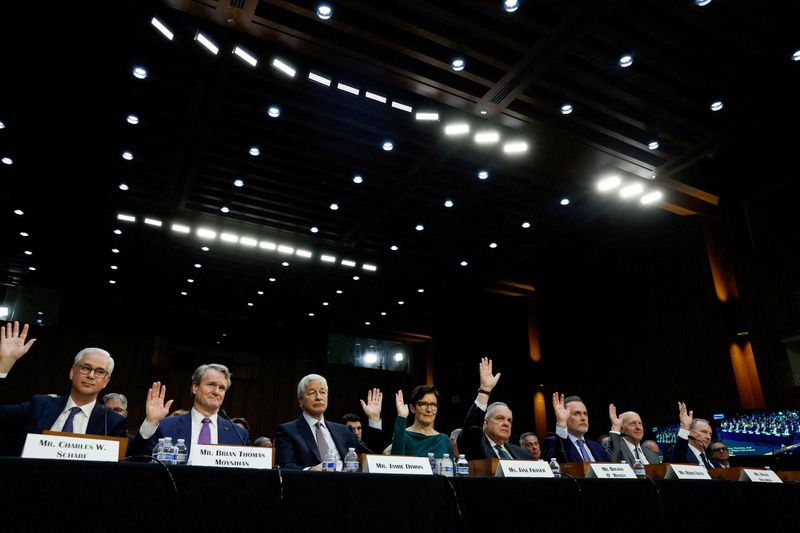By Saeed Azhar and Ross Kerber
NEW YORK/BOSTON (Reuters) - Goldman Sachs and Bank of America will face challenges on Wednesday as proxy advisers recommend investors vote for the banks to separate their CEO and chairman's roles, in an effort to improve the companies' governance.
After the 2008 financial crisis, investors seeking to improve risk oversight mounted efforts to divide the roles on Wall Street, an idea that has picked up new interest in recent years according to analysts.
With support from influential proxy advisers Institutional Shareholder Services (ISS) and Glass Lewis, some investors are leaning towards supporting shareholder resolutions to split the roles, but getting wider support will be tough.
"I would love for a company on the echelon of Goldman Sachs to separate those two roles so there's more oversight," said David Wagner, a portfolio manager at Aptus Capital Advisors, which owns Goldman shares. "I'm a believer in the separation of church and state, even though I believe David Solomon would continue to retain decision making authority," Wagner said.
Goldman CEO David Solomon, who holds the dual role, recently stepped back from bank's foray into consumer banking, which had piled up losses, to refocus the bank's strategy on two core divisions: investment banking and trading, and asset and wealth management.
Bank of America's Brian Moynihan has held the dual role since 2014, four years after he took the helm as CEO. He has been credited with turning around the company after the 2008 crisis.
Norway's $1.6 trillion sovereign wealth fund, one of the world's largest public investors, said it will support the resolutions calling for Goldman and BofA to divide the roles.
The fund generally endorses nonexecutive chairs as being in a "stronger position to guide strategy, oversee management and promote the interests of shareholders," it said in a 2018 report.
Just 16% of investors backed a similar proposal for Goldman Sachs last year, while 26% of BofA shareholders voted in favor of the move in 2023.
At top U.S. banks, 58% had combined roles as of last year, versus 40% for all companies in the S&P 500, according to ISS.
Banks often fended off such attempts by making other changes, such as giving new powers to a lead independent director, as Goldman did in 2013.
JPMorgan Chase (NYSE:JPM), the largest U.S. lender, plans to split the roles when CEO Jamie Dimon eventually steps down, according to its annual proxy statement.
"The separation of CEO and chairman roles is one of those corporate governance 'best practices' that looks great on paper, but when you apply it to a real-world situation, you're stripping the title from a sitting CEO," said William Regner, a partner at law firm Debevoise & Plimpton.
Others disagreed. "From a governance standpoint, it makes a lot of sense," said Charles Elson, founding director of the Weinberg Center for Corporate Governance. "These are two distinct roles - CEOs run companies, boards oversee CEOs. And combining the two weakens the oversight ability of the board, because the chair controls the agenda of the meeting, and the meeting itself." Despite efforts by companies to convince shareholders of their robust governance structures, a record 69 investor resolutions advocating for independent chairs were voted at S&P 500 companies last year, according to ISS.
Both Bank of America and Goldman contend that their lead independent board directors provide sufficient oversight. That view is shared by some key investors and analysts. "A strong lead independent director, from a credit standpoint, can be just as positive as having an independent chairman," said David Fanger, senior vice president at rating agency Moody's (NYSE:MCO).
BlackRock (NYSE:BLK) funds voted against the independent chair proposals at Goldman and Bank of America last year. In separate reports about both banks, BlackRock said they each had "a designated lead director who fulfills the requirements" appropriate to the role.
Lead independent directors should have the ability to call and preside over board meetings of independent directors and provide formal input to their agendas, BlackRock said in its 2024 proxy guidelines. Vanguard and State Street (NYSE:STT), which also hold big stakes in Goldman and BofA, have also voted against past proposals to split the two roles. They declined to comment on the upcoming votes.
Berkshire Hathaway (NYSE:BRKa), Bank of America's biggest shareholder, did not respond to a request for comment.BofA shareholders have repeatedly voted in favor of the board retaining flexibility to determine the most effective leadership structure "based on applicable circumstances and needs," the second-largest U.S. lender said in its proxy statement. A Goldman Sachs spokesperson said the firm's governance committee made clear that a strong lead independent director, alongside the chairman-CEO role, is the most effective at this time.
Investors are getting a "clear story" on Goldman Sachs' strategy after Solomon's decision to slim down its money-losing consumer business, Wagner said.
Goldman's first-quarter results beat estimates, fueled by a recovery in its traditional mainstays - underwriting, deals and bond trading.
